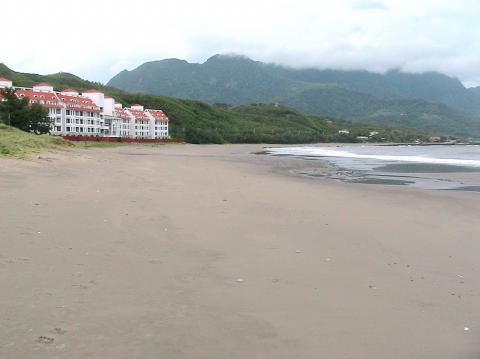The Supreme Administrative Court ruled on Thursday that the beachfront Meiliwan Resort Hotel (美麗灣渡假村) development in Taitung County’s Shanyuan Bay (杉原灣), in which Taitung County Government is a partner, was guilty of procedural violations and that as a result all work should stop immediately.
Thomas Chan (詹順貴), an attorney representing local residents, said the verdict invalidated the company’s construction permits and the project would now have to go through a new environmental impact assessment.
The case stems from 2004, when the Taitung County Government signed a build-operate-transfer contract with the developer, Meiliwan Resort Hotel Co, to construct a six hectare hotel complex on the beach.

Photo: Courtesy of Lin Shu-ling
However, for the past seven years, Aboriginal residents and environmental groups have filed lawsuits and staged protests against the project, saying the local government’s decision to permit the construction was flawed and that the hotel would harm the environment and the livelihoods of Amis residents.
The verdict was made on the grounds that several county government officials attended environmental impact assessment review meetings despite conflicts of interest, which constituted a violation of procedural fairness.
In addition, the county government failed to ask the developer to present supplementary evidence to prove that the development project would not pollute the ocean.
The county government yesterday said it had not yet received the ruling in writing. If the court had ruled that the project’s environmental impact assessment was invalid then the developer would be instructed to halt construction in accordance with the ruling, officials said.

DAREDEVIL: Honnold said it had always been a dream of his to climb Taipei 101, while a Netflix producer said the skyscraper was ‘a real icon of this country’ US climber Alex Honnold yesterday took on Taiwan’s tallest building, becoming the first person to scale Taipei 101 without a rope, harness or safety net. Hundreds of spectators gathered at the base of the 101-story skyscraper to watch Honnold, 40, embark on his daredevil feat, which was also broadcast live on Netflix. Dressed in a red T-shirt and yellow custom-made climbing shoes, Honnold swiftly moved up the southeast face of the glass and steel building. At one point, he stepped onto a platform midway up to wave down at fans and onlookers who were taking photos. People watching from inside

A Vietnamese migrant worker yesterday won NT$12 million (US$379,627) on a Lunar New Year scratch card in Kaohsiung as part of Taiwan Lottery Co’s (台灣彩券) “NT$12 Million Grand Fortune” (1200萬大吉利) game. The man was the first top-prize winner of the new game launched on Jan. 6 to mark the Lunar New Year. Three Vietnamese migrant workers visited a Taiwan Lottery shop on Xinyue Street in Kaohsiung’s Gangshan District (崗山), a store representative said. The player bought multiple tickets and, after winning nothing, held the final lottery ticket in one hand and rubbed the store’s statue of the Maitreya Buddha’s belly with the other,

‘NATO-PLUS’: ‘Our strategic partners in the Indo-Pacific are facing increasing aggression by the Chinese Communist Party,’ US Representative Rob Wittman said The US House of Representatives on Monday released its version of the Consolidated Appropriations Act, which includes US$1.15 billion to support security cooperation with Taiwan. The omnibus act, covering US$1.2 trillion of spending, allocates US$1 billion for the Taiwan Security Cooperation Initiative, as well as US$150 million for the replacement of defense articles and reimbursement of defense services provided to Taiwan. The fund allocations were based on the US National Defense Authorization Act for fiscal 2026 that was passed by the US Congress last month and authorized up to US$1 billion to the US Defense Security Cooperation Agency in support of the

‘COMMITTED TO DETERRENCE’: Washington would stand by its allies, but it can only help as much as countries help themselves, Raymond Greene said The US is committed to deterrence in the first island chain, but it should not bear the burden alone, as “freedom is not free,” American Institute in Taiwan Director Raymond Greene said in a speech at the Institute for National Defense and Security Research’s “Strengthening Resilience: Defense as the Engine of Development” seminar in Taipei yesterday. In the speech, titled “Investing Together and a Secure and Prosperous Future,” Greene highlighted the contributions of US President Donald Trump’s administration to Taiwan’s defense efforts, including the establishment of supply chains for drones and autonomous systems, offers of security assistance and the expansion of